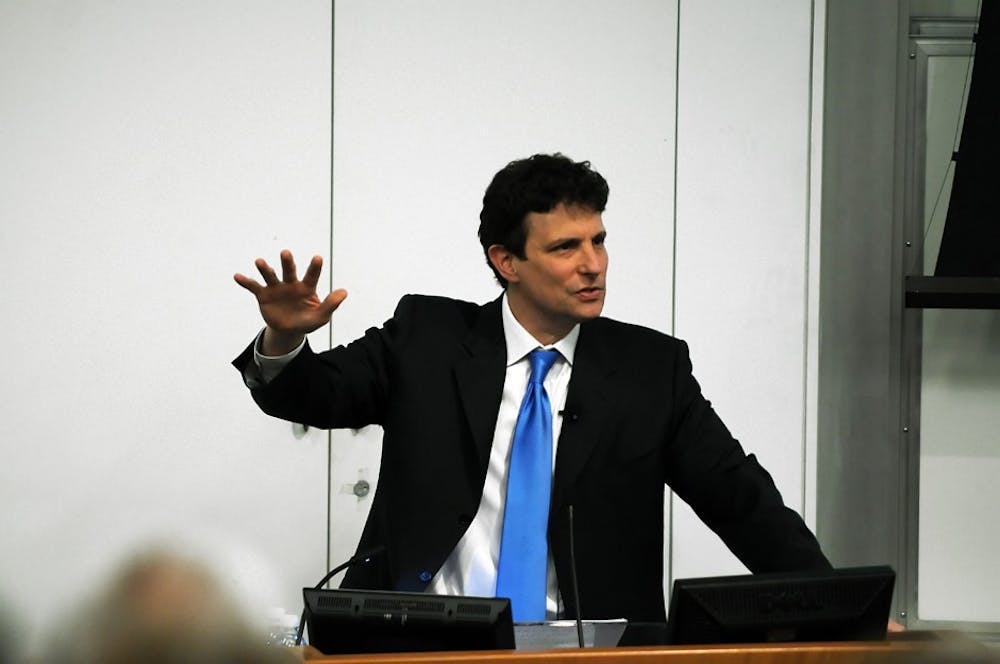
We don’t live in a post-racial time, according to Editor of The New Yorker David Remnick.
Remnick spoke Wednesday at the Walter and Leonore Annenberg Distinguished Lecture in Communication on “The Joshua Generation: Race and the Campaign of Barack Obama.” The annual lecture series aims to bring a major figure in communications to campus.
“Remnick fits the bill to a tee,” said Michael Delli Carpini, dean of the Annenberg School.
Remnick — a celebrated journalist and Pulitzer Prize winning author — rose through the ranks at The Washington Post and at The New Yorker, where he was named editor in 1998. He recently published his sixth book entitled The Bridge: The Life and Rise of Barack Obama, from which the theme of the lecture stemmed.
“It is a fabulous book,” Annenberg Public Policy Center director Kathleen Hall Jamieson said. “He was not drawn into the seductive power of Barack Obama like many other writers, giving an analytic frame for Obama as a person.”
Penn President Amy Gutmann, once Remnick’s professor at Princeton University where he attended as an undergraduate, compared his success in the print media world to that of Babe Ruth in baseball. She praised how he nursed the ailing ‘New Yorker’ to health, raising the magazines circulation to a million and boldly brought it into the digital age, all without sacrificing the publication’s unique heritage.
Remnick’s discussion centered on the racial aspect of Obama’s persona. “We tend to drift right past one of the most radical facts of Barack Obama’s presidency,” he said, “that this was the election of the first African American president.”
Gutmann commented that “we must not underestimate [the election’s] symbolic importance” as the emblem of a new black generation.
Remnick discussed how Obama tactfully did and did not talk about race during his campaign. He noted that Obama announced his candidacy twice — once in Springfield, Ill. to model himself after Abraham Lincoln and once at the Brown Chapel in Selma, Ala., a legendary site in civil rights history. In the latter announcement, Obama inherited “the African American prophetic voice,” which he was able to exceptionally bridge with politics, Remnick said.
His assumption of a distinct preacher-like tone revealed his “talent as a shape shifter,” not unlike Martin Luther King Jr., who spoke at the same pulpit.
Obama’s use of the typical biblical rhetoric of the black church, honoring the past “Moses Generation” and foreseeing the “Joshua Generation,” was quite telling of his racial motivation, Remnick added. Like the biblical Joshua, Obama saw himself as leading black Americans into the promised land of electoral politics.
Because of Obama’s roots and upbringing, he had to consciously pursue a black identity. Remnick remarked that we must take into account Obama’s cognizance of black civil rights and political heroes of the 1960’s when reflecting on his presidency.
He did stress, however, that old racial schemas of the 1960’s have withered, allowing for an atmosphere in which Obama could ascend the presidency.
Remnick’s son Alex, a College sophomore, is an associate photo editor and former photo editor for The Daily Pennsylvanian.
The Daily Pennsylvanian is an independent, student-run newspaper. Please consider making a donation to support the coverage that shapes the University. Your generosity ensures a future of strong journalism at Penn.
DonatePlease note All comments are eligible for publication in The Daily Pennsylvanian.








